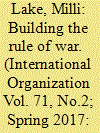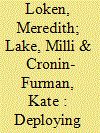| Srl | Item |
| 1 |
ID:
153604


|
|
|
|
|
| Summary/Abstract |
Why have peace-building and reconstruction efforts so frequently failed to create durable institutions that can deter or withstand resurgent violence in volatile sites of cyclical conflict? Extant theory predicts that new institutions can help overcome violence and mitigate commitment problems in postconflict contexts by reducing uncertainty in inherently uncertain environments. By contrast, this article argues that postconflict institutions often prove limited in their abilities to contribute to durable peace because they offer wartime elites new venues in which to pursue conflict-era agendas. Through a micro-analysis of efforts to build the rule of law in eastern Democratic Republic of Congo, I demonstrate that wartime elites capture and instrumentalize new legal institutions to maximize their intra- and inter-organizational survival; to pursue economic, military, and political agendas behind the scenes; and, in some cases, to prepare for an imminent return to war.
|
|
|
|
|
|
|
|
|
|
|
|
|
|
|
|
| 2 |
ID:
163272


|
|
|
|
|
| Summary/Abstract |
Why do governments and militaries publicly condemn and prosecute particular forms of abuse? This article explores the Sri Lankan government's decision to promote limited legal accountability for state-perpetrated rape committed in a country otherwise renowned for widespread impunity. We argue that rather than representing a turn against impunity, the symbolic stance against conflict-related sexual violence in a small number of high-profile cases served an explicitly politico-military agenda. The state deployed legal accountability in specific cases to garner political legitimacy among key domestic audiences. The Sri Lankan government drew on the symbolism of female victimhood to mobilize support at a time when support for military counterinsurgency was waning. We show that governments can uniquely instrumentalize sexual violence cases to establish moral authority and territorial legitimacy. Through an examination of the domestic legal response to state-perpetrated human rights abuses, we illustrate the many ways in which women's bodies—and the law—can be mobilized in war to serve military ends.
|
|
|
|
|
|
|
|
|
|
|
|
|
|
|
|
| 3 |
ID:
134518


|
|
|
|
|
| Summary/Abstract |
In recent years, courts in the Democratic Republic of Congo (DR Congo) have produced some of the most progressive judicial decisions against perpetrators of gender violence of anywhere in the world. Yet, DR Congo is often described as the archetypal collapsed state. This article uses a case study of domestic courts in Eastern DR Congo to analyze how and why complex functions of domestic governance—such as the production of frequent and high-quality judicial decisions by domestic courts—are able to persist, even flourish, in an area where the state is characterized by extreme fragility and weakness. I argue that, rather than a decoupling of law and practice as previous approaches might predict, state fragility in DR Congo has created openings for domestic and transnational actors to exert direct influence over judicial processes at multiple levels of governance. The involvement of external actors in the domestic authority structures of states has resulted in surprisingly progressive human rights outcomes in certain issue areas. However, the article also documents some of the unintended consequences of human rights developments that occur at the very peripheries of broader state-building projects.
|
|
|
|
|
|
|
|
|
|
|
|
|
|
|
|
| 4 |
ID:
186686


|
|
|
|
|
| Summary/Abstract |
In environments of seemingly intractable conflict, how should we understand the role of state capacity building and security-sector reform in transitions to peace? Prevailing wisdom suggests that a strong state security apparatus mitigates cyclical violence and aids in transitions to predictable, rule-governed behavior. Yet growing attention to police brutality in institutionalized democracies calls this assumption into question. Drawing on a multiyear study of war making and state making in eastern DR Congo, this article interrogates logics of police capacity building, analyzing how and why reform efforts intended to bolster the state’s monopoly on violence frequently fail to curb the unrest they seek to disrupt. I argue that enhancing the coercive capacity of the police can entrench a wartime political order that makes peace more elusive; when police deploy the image of the state toward destabilizing ends they reinforce the institutions of everyday war, undermining the stability a monopoly on violence is intended to build.
|
|
|
|
|
|
|
|
|
|
|
|
|
|
|
|